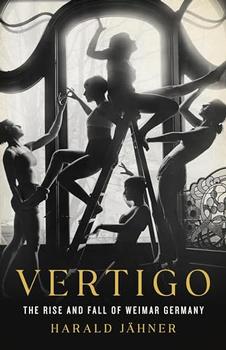
The Rise and Fall of Weimar Germany
by Harald Jähner
The dramatic and consequential history of Germany's short-lived experiment with democracy between the world wars, when vibrant cultural experimentation collided with political and economic turmoil.
Out of the ashes of the First World War, Germany launched an unprecedented political project: its first democratic government. The Weimar Republic, named for the city where it was established, endured for only fifteen years before it was toppled by the insurgent Nazi Party in 1933. In Vertigo, prizewinning historian Harald Jähner tells the Republic's full story, capturing a nation caught in a whirlwind of uncertainty and struggling toward a better future.
In the aftermath of World War I, Germany was buffeted by political partisanship, economic upheaval, and the constant threat of revolutionary violence. At the same time, many Germans embraced newly liberated lifestyles. They flouted gender norms, flooded racetracks and dance halls, and fostered a vibrant avant-garde that encompassed groundbreaking artists like filmmaker Fritz Lang, painter Wassily Kandinsky, and architect Walter Gropius. But this new Germany sparked a reactionary backlash that led to the Republic's fall to the Nazis and, ultimately, the conflagration of World War II.
Blending deeply researched political history with the firsthand experiences of everyday people, Vertigo is a vital, kaleidoscopic portrait of a pivotal moment in German history.
"Outstanding…A gripping account of a nation's experiment in democracy." ―Kirkus Reviews (starred review)
The Weimar Republic is a byword for hedonism and excess. A new history captures the mood with gusto…For obvious reasons most histories of the Weimar years are dominated by politics, with Hitler and his cronies lurking ominously on the margins. But Jähner's account is more unconventional, more surprising and, frankly, more enjoyable…I enjoyed it enormously." —Sunday Times
"Energetic and engaging…Jähner's approach not only carries a heavy cultural spin but puts the politics of collective feeling—from exhilaration to despair—centre stage." ―Financial Times (UK)
"Wonderfully written and compulsively, electrifyingly readable. The Weimar Republic and its chilling fall is—like Shakespearean tragedy—an enduringly fascinating, profoundly human story. And with consummate skill and a rich breadth of research, Harald Jähner makes us look again at what we thought we knew and gives this history new, extraordinary depth. Taking us through the neurotic violence of the 1918 German revolution, and the neon flowering of Weimar art and culture, thence to the dark rise of Hitler, Jähner deftly overturns many old assumptions about economics and politics along the way. And against this backdrop, he also invites us to explore everything from nude gymnastics to modernist architecture, fast cars to dance halls, and, fundamentally, love and loss and the cold horror of hate." ―Sinclair McKay, author of The Secret Lives of Codebreakers
"Any decent centrist will shiver at this wonderfully illustrated account of how Weimar's heady metropolitan progressiveness failed to cope with loss of national pride, technological modernism, social change, early globalization, and financial crash. The confidence of the middle classes was lost, readying them to accept wild conspiracy theories: a new fusion of hard left and hard right, National Socialism, was swept to power by Germany's flyover country, with disastrous results which the traditional elites only saw too late. Vertigo provides a priceless lesson for anybody interested in Germany then—or the world today." ―James Hawes, author of The Shortest History of Germany
"Vertigo is outstanding. Harald Jähner's gift for illuminating the big picture with telling detail gives the reader an uncanny sense of what it was actually like to be present in Germany during the Weimar Republic. This is history at its very best." ―Julia Boyd, author of Travelers in the Third Reich
This information about Vertigo was first featured
in "The BookBrowse Review" - BookBrowse's membership magazine, and in our weekly "Publishing This Week" newsletter. Publication information is for the USA, and (unless stated otherwise) represents the first print edition. The reviews are necessarily limited to those that were available to us ahead of publication. If you are the publisher or author and feel that they do not properly reflect the range of media opinion now available, send us a message with the mainstream reviews that you would like to see added.
Any "Author Information" displayed below reflects the author's biography at the time this particular book was published.
Harald Jähner is a cultural journalist and former editor of the Berliner Zeitung. He was also an honorary professor of cultural journalism at the Berlin University of the Arts. His book Aftermath: Life in the Fallout of the Third Reich was shortlisted for the Cundill History Prize and the Baillie Gifford Prize for Non-Fiction. He lives in Germany.
I find that a great part of the information I have was acquired by looking something up and finding something else ...
Click Here to find out who said this, as well as discovering other famous literary quotes!
Your guide toexceptional books
BookBrowse seeks out and recommends the best in contemporary fiction and nonfiction—books that not only engage and entertain but also deepen our understanding of ourselves and the world around us.